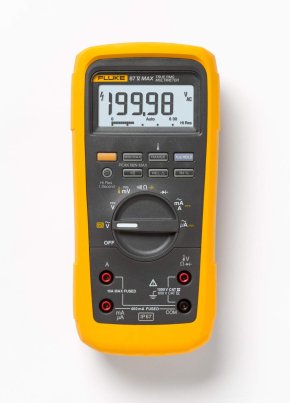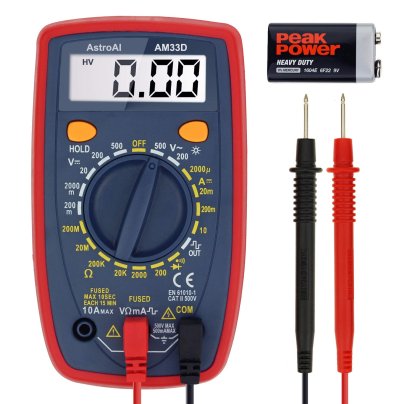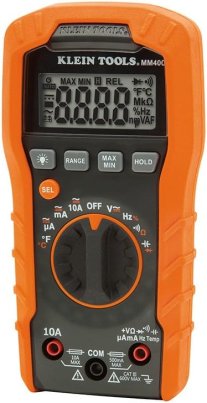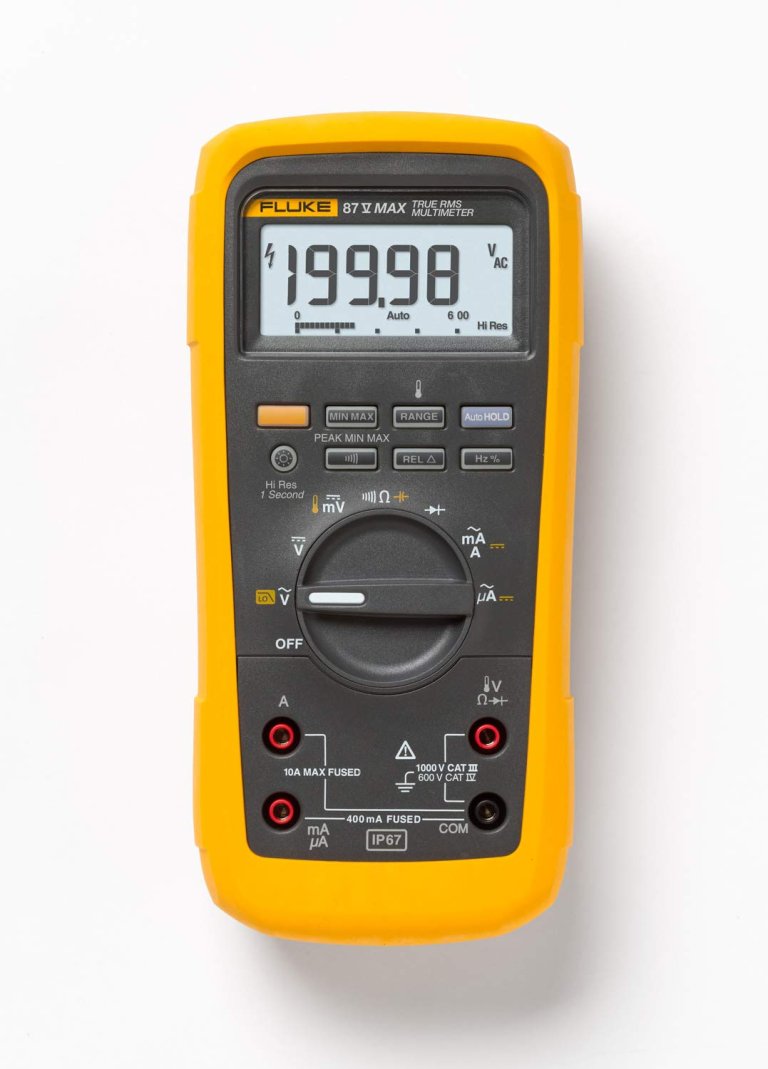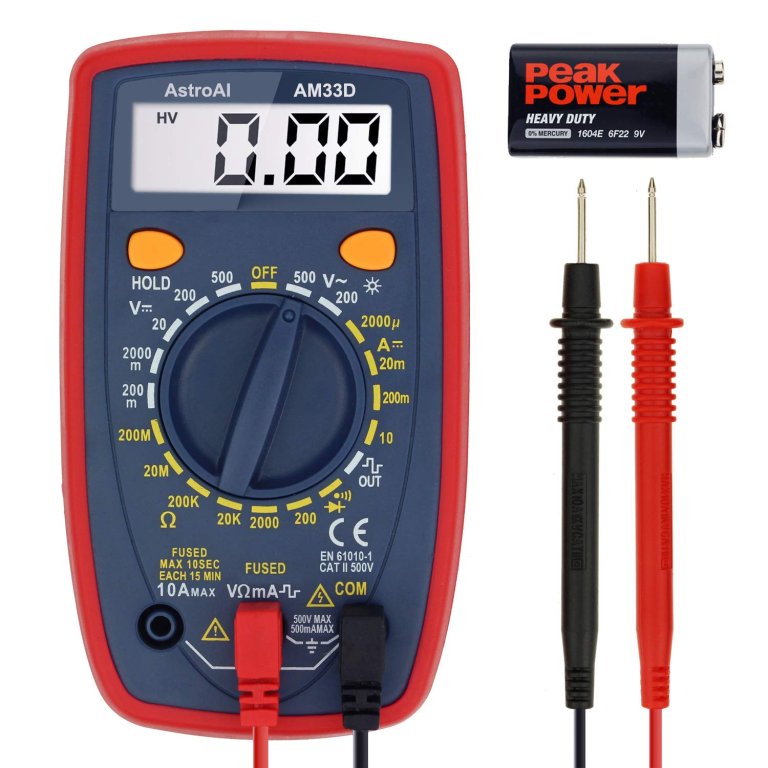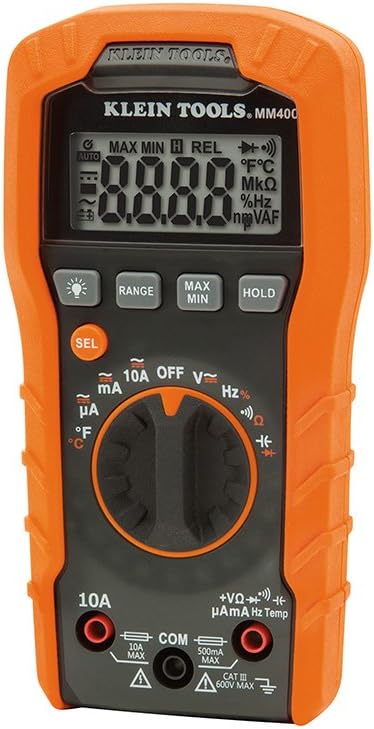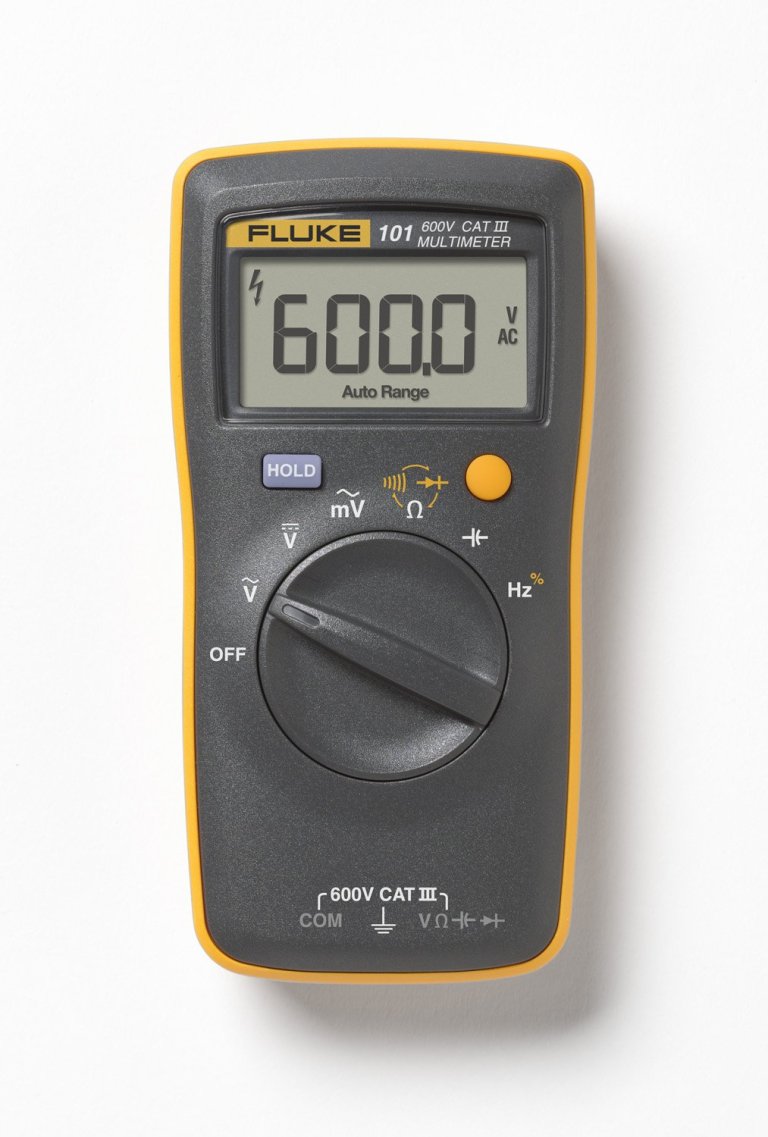We may earn revenue from the products available on this page and participate in affiliate programs. Learn more ›
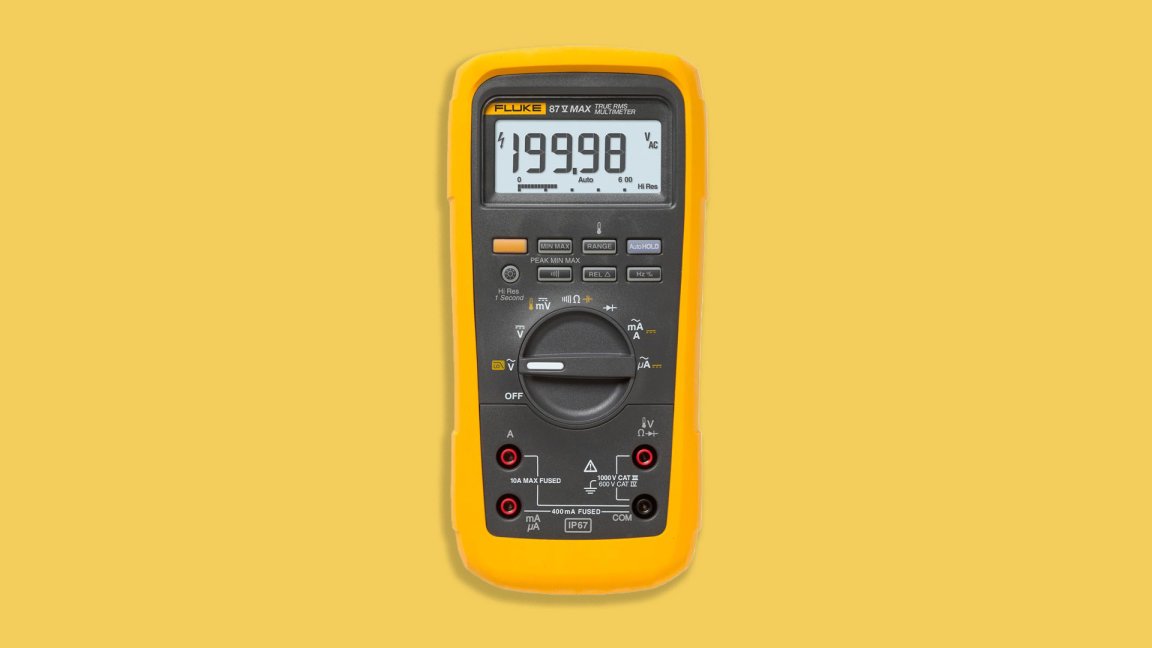
If you’re planning on messing around with your cars, a multimeter is a necessity. Many of the vehicle’s vital systems depend on electricity, such as your ignition, fuel, and charging networks. Buying a multimeter and learning how to use it can help you quickly pinpoint electrical issues. Depending on who you ask, the right multimeter for you will either be the first thing you find at the parts store or the top-of-the-line unit all of the professionals use. Neither of these suggestions is wrong, and you’ll probably wind up buying both. I’m here to help you understand a little more about why that is, as well as talk about the multimeters you want to add to your collection.
Summary List
- Best Overall: Fluke 87V Max True-rms Digital Multimeter
- Best Value: AstroAI Multimeter 2000 Counts Digital Multimeter
- Honorable Mention: Klein Tools 600V Auto-Ranging Digital Multimeter
- Best Compact: Fluke 101 Digital Multimeter
- Best for Work in Multiple Fields: Fluke FLUKE-179-2/IMSK Industrial Multimeter Service Kit
Our Methodology
Different projects demand different things from multimeters, which is why you’ll find such a wide range of types and features while shopping around. I based the criteria of what to recommend to a DIY mechanic or aspiring professional on what I use on my own cars, which is a traditional digital multimeter. Because my experiences only give us so much to run on, I also made sure to take advice from the professional mechanics who discuss this very topic all over the internet. To make a long story short, I did my homework to avoid pushing anything that’ll end up in the scrap electronics pile in short order.
Best Multimeter Reviews & Recommendations
Best Overall: Fluke 87V Max True-rms Digital Multimeter
Best Overall
See ItPros
- High durability
- Dustproof and waterproof case
- High accuracy
- Limited lifetime warranty
Cons
- Expensive
- Bulky
You already know why the Fluke 87V Max is on the top of my list. The name alone tells you it’s the kind of multimeter you can count on for years. If anything, it’s over-engineered to handle the many bumps and bruises it’ll face under the hood. The dustproof and waterproof body also ensures you don’t need to worry about problems starting from within. This is a professional-level tool that offers the kind of accuracy those especially sensitive jobs demand. Just like you can expect from any professional tool, it’s backed by a lifetime warranty to offer you peace of mind with your investment.
The biggest issue with this multimeter for many is the price. Few hobbyists will feel compelled to pay the pro-level price for something they’re just getting their feet wet with. The other issue to be aware of is that this is a rather bulky unit that can be awkward to handle.
Best Value: AstroAI Multimeter 2000 Counts Digital Multimeter
Best Value
See ItPros
- Affordable
- Great quality for the price
- Backlit LCD
- Features Data Hold function
Cons
- Quality control issues are common
- Low durability
I know you skipped right past the top pick to check out this AstroAI multimeter. The price is just too good to pass up, and it’s going to work just fine for most DIY automotive projects. It might not be the most prestigious multimeter, but it will test DC voltage, continuity, and resistance, which is all most hobbyists need. This also has a very handy Data Hold feature and a backlit LCD. All of that is great, but the quality for the price is the real reason it takes our pick for Best Value. There are many multimeters in its price range, but this far surpasses the majority of them.
As good as this multimeter is, it simply doesn’t compare to higher-end options. Quality control problems appear to be fairly common, and durability certainly isn’t its strong suit.
Honorable Mention: Klein Tools 600V Auto-Ranging Digital Multimeter
Honorable Mention
See ItPros
- Affordable
- High durability
- Backlit display
- Features Data Hold function
Cons
- Low accuracy
- Quality control issues are common
Klein’s multimeters are another solid choice for folks working on a budget with the added benefit of getting a tool from one of the best names in the business. This 600V auto-ranging multimeter has a lot to offer the DIY mechanic. Its backlit LCD screen is easy to read when you’re crammed in those dark places. Its Data Hold function keeps you from repeating numbers until you reach a notepad. The durable case will protect it from the many drops it’ll experience during the madness, and the leads and thermocouple with adapter give you options for probing.
Unfortunately, this is not the best representation of what Klein Tools is capable of. Accuracy is a concern that you need to take into consideration as you take readings. It’s also plagued with the same quality control issues as many in its price range.
Best Compact: Fluke 101 Digital Multimeter
Best Compact
See ItPros
- Affordable
- Compact and easy to carry
- Features Data Hold function
- High durability
Cons
- No warranty
- Non-backlit display
No, not all Fluke multimeters are massive hunks of equipment, nor are they all massively expensive. The Fluke 101 is the choice for many who want the pro-grade name without the pro-grade price in a package they can easily carry in their pocket. This multimeter is every bit as durable and dependable as you would expect it to be, and it’s more than accurate enough for typical automotive electrical projects. It’s also hard not to talk about that Data Hold function that’ll keep you from losing your mind.
It’s worth noting that this is not backed by any kind of warranty as you might expect it to be with the Fluke name on it. Also, this is the only multimeter on our list without a backlit LCD, which can be a problem in many places where a compact multimeter comes in handy.
Best for Work in Multiple Fields: Fluke FLUKE-179-2/IMSK Industrial Multimeter Service Kit
Best for Work in Multiple Fields
See ItPros
- Includes clamp meter and accessories
- High durability
- High accuracy
- Solid warranties on meters
Cons
- Expensive
- Meter tends to pick up “ghost voltage”
Many people who work on their cars tackle a multitude of different projects, and this setup from Fluke is a great way to get started with electrical work. It comes with the high-quality Fluke 179 multimeter that offers the accuracy and supreme durability the brand is known for. The included clamp meter, leads, and accessories that are included make this a solid way for aspiring professionals and serious DIYers to set their sites on industrial and residential projects. Of course, both meters are backed by decent warranties, which is nothing to scoff at.
The price is what’s going to keep this out of the hands of many wrenchers. Even if you’re getting professional tools, not everyone can justify dropping the kind of money this set sells for. There are also reported issues of the meter picking up “ghost voltage,” which will need to be factored into the measurements taken.
Our Verdict on Multimeters
It’s hard to beat the Fluke 87V Max True-RMS Digital Multimeter in terms of quality and performance. If you’re making a living working on cars or are planning on it, that’s the way to go. Those of us just plinking around under the hood and need to save some money will do just fine with the AstroAI Multimeter 2000 Counts Digital Multimeter.
What to Consider When Buying Automotive Multimeters
Folks from all walks of life have some input on what to look for in a multimeter. That’s no surprise considering they’re used in pretty much every technical field in some capacity. However, it’s important to remember that what’s best for residential or industrial work isn’t always what you need under the hood. This buying guide will help you get a basic understanding of what you need from a multimeter for automotive work.
Types of Automotive Multimeters
Digital
Most multimeters you come across are digital, and this is the first type you should invest in. They are easy to use thanks to a digital display that shows numeric values of the measurement selected with the large dial below. These multimeters can come loaded to the teeth with useful functions to help make your life as easy as possible. I highly recommend investing in a model with a backlit LCD and Data Save function as they can be real life savers when working in dark or awkward spaces.
Analog
An analog multimeter offers many of the same functions as many digital versions, but instead of a digital reading, a sweeping needle and gauges are used to display data. The same needle is used to give different readings as multiple gauges sit behind it. You must ensure you select the right setting and read the correct gauge to ensure you’re getting accurate readings with this type of meter. Digital multimeters are far more desirable to the average mechanic because they are far easier to accurately read.
Automotive Multimeter Key Features
Readings and Ranging
A multimeter is of no use to you if it can’t read what you need it to. You need a multimeter to read DC voltage, resistance, and continuity for use with automotive work. It’s also important to make sure you select the range that allows you to work as fluently as possible. You will have the option to pick multimeters with either manual or auto-ranging of certain readings. I recommend beginners go with auto-ranging as you simply select the type of reading you want without worrying about the given range the value of that reading may exist within. However, it’s not that hard to learn what range the readings you’re after exist within, and a manual ranging multimeter is a great choice for those who want to obtain readings more quickly.
Leads
You want to take a look at both the type of lead a multimeter has to work with and how long the cables are. As for the type of leads, most multimeters come with a standard set of probes, and that’s perfect for general automotive work. If you want different types of probes you must make sure that the model you are considering has them available to it. As for length, there is no universally superior choice. Some folks prefer longer cables for the extended reach, and others like the neatness of short cables. Which is right depends on your preferences and it’s something to think about while you shop around.
Display
There are a lot of physical variables to consider when selecting a multimeter. How large it is, its durability, whether there are slots for the leads, and so on. Those are all worth reading into, but none are as important as the display. Make sure you pick up a multimeter you can easily read. If that means picking a model with a larger-than-normal display, so be it. The last thing you need to be doing is adjusting a multimeter to see it better while your hands are already occupied.
Automotive Multimeter Pricing
You can pick up a multimeter for a little over $10 at the parts store or spend north of $500 on a top-shelf unit. Which is right for you? That depends. If you’re just looking to do some quick troubleshooting, get the $10 piece. It’ll work just fine for getting you in the right ballpark. If you’re a little more serious about working on automotive projects, moving to the $50 to $100 range is worth the increases in accuracy and reliability. If you’re making a living under the hood or plan to use a multimeter for other jobs where accuracy is of utmost importance, spend the money and get yourself a professional unit. Don’t cry too much over it because a good multimeter can provide a lifetime of service.
FAQs
You’ve got questions. The Drive has answers.
A: The answer is almost unanimously Fluke. The accuracy, quality, and dependability of Fluke multimeters is hard to top. They are expensive, though. You don’t need a top-of-the-line multimeter for basic DIY automotive work, though, so whatever you can afford is what’s best for you.
A: A multimeter is a great diagnostic tool, but there are other tools you’ll want in its place from time to time. A test light, spark plug tester, fox hound tool, and OBDII scanner are other types of electrical diagnostic tools you should also invest in for diagnosing automotive electrical issues.
A: For the most part, yes. You can use just about any multimeter on a car for DIY work. Investing in high-end multimeters and specific features becomes warranted as a professional or when tackling highly specific projects.
